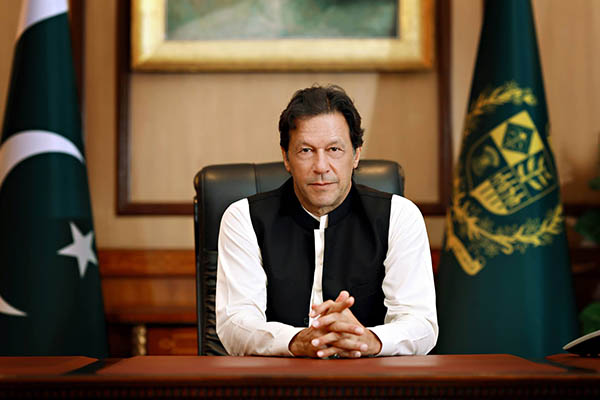
File photo
In interview, prime minister claims Afghans cannot be expected to respect women’s rights by Western standards
Prime Minister Imran Khan on Tuesday said that Pakistan cannot afford to be internationally “isolated” if it becomes the first state to recognize the Taliban-led government in Afghanistan.
“If Pakistan was the first [country] to grant recognition to the Taliban, the international pressure would become too much for us as we try to turn our economy around,” he told French daily Le Figaro in an interview that was broadcast on state-run television. “To be isolated by becoming the only state [to recognize the Taliban] would be the last thing we would want,” he said, adding that the interim government should be recognized through a “collective process.”
To a question on global concerns over the Taliban’s human rights record, he reiterated his claims that the “Afghans are a proud people” who cannot be forced to act in accordance with external demands. “There is a limit to what foreign pressure can do to a government like the Taliban … Afghans should not be expected to respect women’s rights as Westerners understand them,” he said, adding that given time the Taliban would enact due rights, as they had done by allowing girls’ education—reportedly from next month.
Reiterating his concern over a looming humanitarian crisis in Afghanistan, he said Islamabad desired stability in its neighboring state because it would reduce the space available to terror groups that target Pakistani soil from across the border. Pointing to the Pakistani Taliban, Baloch separatists, and Daesh, he said the “more stable” the Afghan government was, the less these groups would be able to operate.
To a question on whether Pakistan trusted the Taliban to prevent terrorists from using Afghan soil, Khan claimed the group had “restored security” after it took over Afghanistan in the 1990s, adding that the Taliban would also suffer if they couldn’t restrain such groups. “It is in their interest to stop international terrorism,” he claimed.
Reiterating that Pakistan wanted to be “partners with the U.S. in peace and not war,” he dismissed a question on whether Islamabad would be willing to allow the U.S. to utilize bases to target extremists in Afghanistan. “We do not want international terrorism to operate from Afghanistan, but this can only be done with the help of the Taliban government,” he said.
India and Pakistan
On the possibility of normalizing ties between Pakistan and India, the prime minister stressed it depended on Delhi restoring the special constitutional status of Jammu and Kashmir. “Talking with India would be a betrayal of the Kashmiri people who have suffered so much and who live in an open-air prison environment with 800,000 troops deployed in the region,” he said, reiterating that Delhi’s unilateral abrogation of the disputed region’s status on Aug. 5, 2019 was in violation of the relevant United Nations Security Council resolutions. “It is possible to build a relationship with India, but this requires the restoration of Kashmir’s autonomy. They have violated international law with this abrogation,” he added.
“We are dealing with a government that is not rational, whose ideology is based on hatred of religious minorities and Pakistan. We can’t talk to them. We are at a dead end,” he said of the government of Prime Minister Narendra Modi.
On a question of the perceived hypocrisy in him pointing out the abuse of Kashmiris while dismissing concerns about China’s treatment of Uighur Muslims in Xinjiang, he said the difference was that Kashmir was a “disputed” territory and it was “natural” for him to raise a voice in defense of Kashmiris, as a third of the region was administered by Pakistan. “Kashmir is directly a matter of concern for Pakistan,” he added.
The prime minister also addressed Pakistan’s ties with France, maintaining that he was in contact with French President Emmanuel Macron and the two countries would work to boost their bilateral relations.
